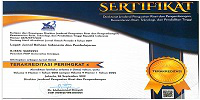Comparison of Decreased Ability of Seven Language Components in Ischemic Stroke Sufferers
Abstract
Language has a very close relationship with the human brain, so if there is damage to brain cells, it will result in language disorders. For example, stroke is the main cause of aphasia. Sufferers will experience difficulties in interacting, which results in the emergence of deviations in grammar. This article aims to show deviations in the 7 language components of two ischemic stroke sufferers and their comparisons. The method used is qualitative, with data collection through interviews and observation techniques both subjectively and objectively. This research is a case study using 2 informants, namely Mr. R and Mrs. O, who are both 64 years old. At the data analysis stage, the data will be identified first based on speech, writing, and behavior. Then, the three resulting data will be grouped, and finally, the results of classifying forms of deviation based on the 7 language components. From this study, it can be seen that there are differences in the decrease in the 7 language components experienced by the two informants. Where Mr. R has decreased language skills in aspects of fluency, reading, and writing. It is different in the case of Mrs. O, who has limitations in terms of content and repetition. But both of them are equally capable in the aspects of naming and comprehension.







